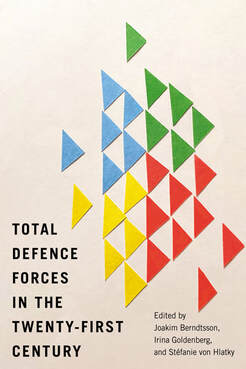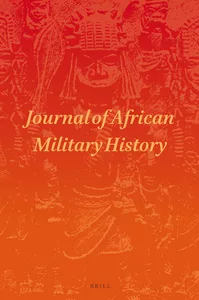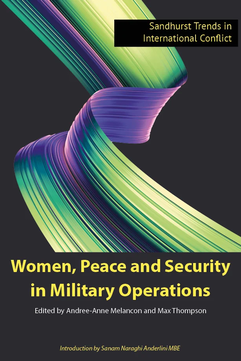|
I am a foreign policy scholar and practitioner focused on contingency contracting and security force assistance, having earned my PhD from King's College London's Defence Studies Department at the UK Joint Services Command and Staff College. Feel free to learn more about my academic work and extracurriculars in the tabs above, and please do reach out if there are any synergies between my work/interests and yours! |
|
In AY2022-23 I was appointed as a Non-Resident Fellow at the Joint Special Operations University (JSOU). JSOU prepares SOF professionals to address strategic and operational challenges, arming them with the ability to think through problems with knowledge, insight, and foresight. I support professional military education and strategic planning efforts in this capacity, and my fellowship has been renewed for AY2023-24.
|
|
In 2021 I was selected as an Advisory Network member for the United Nations on Security Sector Reform. The Network aims to facilitate the exchange of knowledge and practice on SSR among a diverse group of experts from different cultural and geographical backgrounds and fields of expertise. The Network functions as an informal and collaborative community of SSR experts from around the world, who are interested in sharing knowledge and in providing evidence-based advice to the review and further development of United Nations guidance and policies on SSR.
|
|
The International Code of Conduct Association (ICoCA) is a multi-stakeholder initiative formed in 2013 to ensure that providers of private security services respect human rights and humanitarian law. It serves as the governance and oversight mechanism of the International Code of Conduct for Private Security Service Providers (the “Code”). The Code was finalised in 2010, the result of a multi-stakeholder initiative launched by Switzerland. The Code articulates responsibilities of private security companies under human rights and international humanitarian law to ensure the responsible provision of private security services, particularly when operating in complex environments. ICoCA’s mission is to raise private security industry standards and practices that respect human rights and international humanitarian law and to engage with key stakeholders to achieve widespread adherence to its Code globally. I have been a formal ICoCA Observer since 2023.
|
|
The International Studies Association's (ISA) International Security Studies Section (ISSS) is dedicated to enhancing knowledge and understanding about a wide range of international security issues including war and peace, military effectiveness, civil-military relations, alliances and security institutions, terrorism, intervention, peacekeeping, and the political economy of violence, among others. I have been elected to serve on the ISSS Governing Board for a 2023-26 service term and sit on the committee for the ISSS Annual Best Book Award.
|
Recent Collaborative Projects
|
"US Contingency Contractors as Part of the Total Defence Force: Framing the Spectrum of Nonstate Security Actors.” Total Defence Forces in the Twenty-First Century. McGill-Queens University Press. December 2023.
Total defence, as a concept, combines and extends military and civil defence: in a state of war or emergency, all social institutions mobilize to defend the state. Total defence forces, led by a diverse workforce of defence and security professionals, are critical to both national defence and international security goals. This volume focuses on a critical question: what are the main challenges to workforce integration and collaboration, and how can such challenges be overcome to deliver the full potential of the total defence force? Together, scholars and practitioners provide some answers. |
Journal of African Military History. Things Fall Apart: Soviet Assistance to the Somali Armed Forces, 1960–1977. 6 October 2022.As Cold War tensions rose, Soviet aid was offered to the nascent Somali government in pursuit of broader geopolitical machinations that were seen to supersede Somali interests, laying the groundwork for a decades-long mismatch between local intentions and Cold War superpower objectives in the Horn of Africa. Vast quantities of materiel and training were provided to Somalia from 1960 onwards, and by 1976 Somalia boasted a 22,000-man army and was the fourth most heavily armed nation in Sub-Saharan Africa, largely due to Soviet largesse. One year later, the Soviets were expelled and the assistance ceased, having left Somalia with an unsustainable, corrupt, and repressive security structure as a direct result of high levels of foreign assistance that were not well coordinated with host nation sustainment capabilities.
|
Sandhurst Trends in Conflict: Women, Peace and Security in Military Operations. Royal Military Academy Sandhurst and Howgate Publishing. 2023.Civilians are disproportionately impacted by contemporary armed conflict, with women, children, and other vulnerable groups among the most affected. Effective military operations occur against the backdrop of two major shifts in international thinking on security: Human Security and the Women, Peace and Security agenda (WPS). These innovations have radically transformed the field of contemporary security studies and continue to evolve and be debated in both academic and policy circles. However, militaries have been slow to adopt these ideas and adapt their behaviours to account for the importance of protecting civilians, gender mainstreaming, women’s participation, responsibilities on children in conflict, and preventing egregious crimes, such as modern slavery and human trafficking. This book is a conversation between academics and civilian and military practitioners to better understand the contemporary challenges and obligations militaries have towards realising the WPS agenda. Drawing on expertise from military, academia, and civil society it offers insights and recommendations on how militaries can effectively integrate the WPS agenda into their operations.
Chapter 6 “Enhancing Operational Effectiveness Through an Analysis of the Women, Peace, and Security Environment in Djibouti.” |







